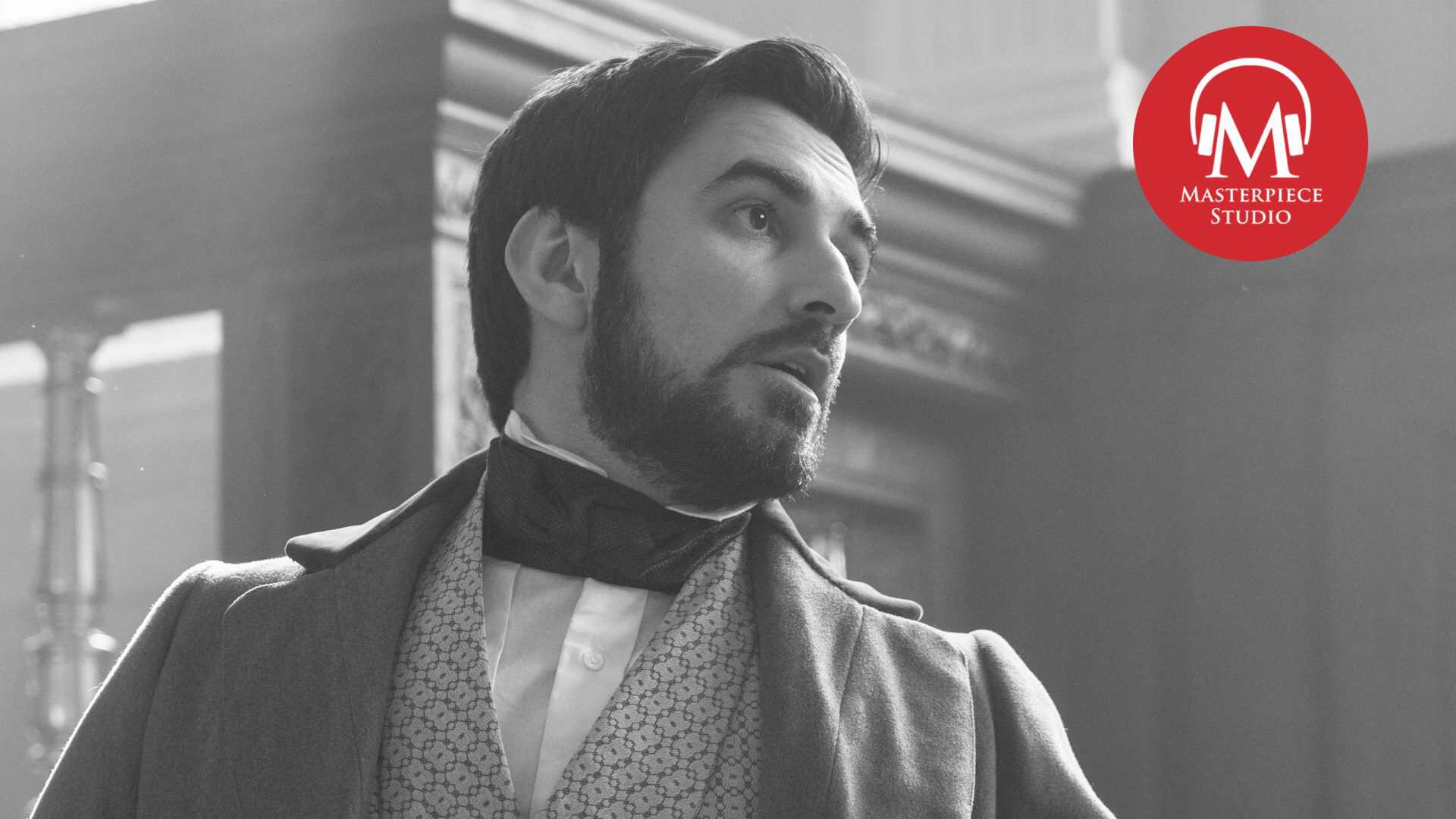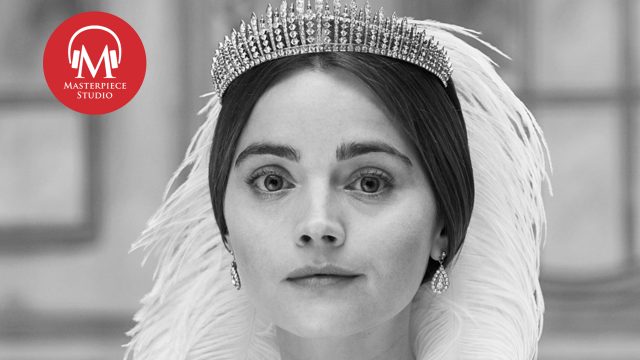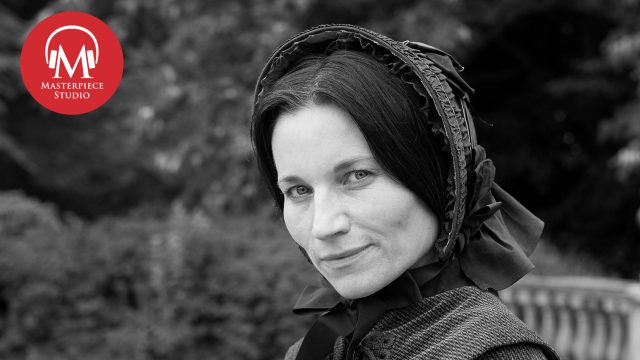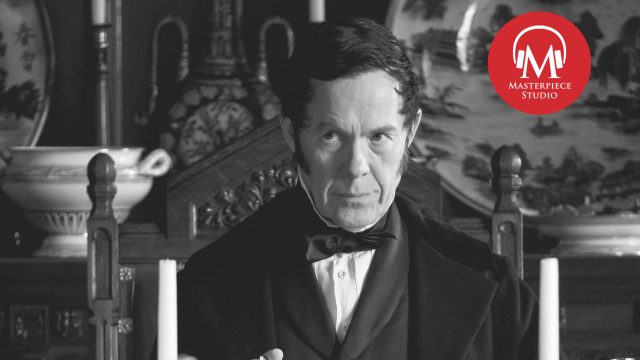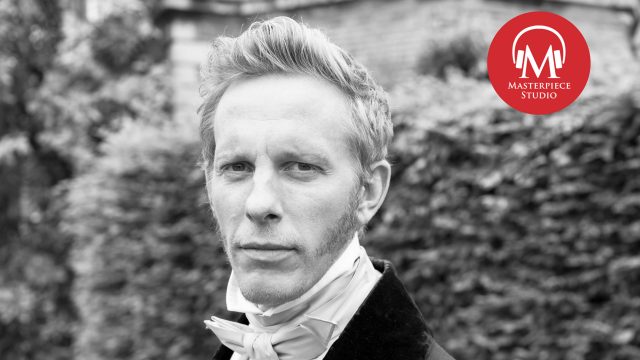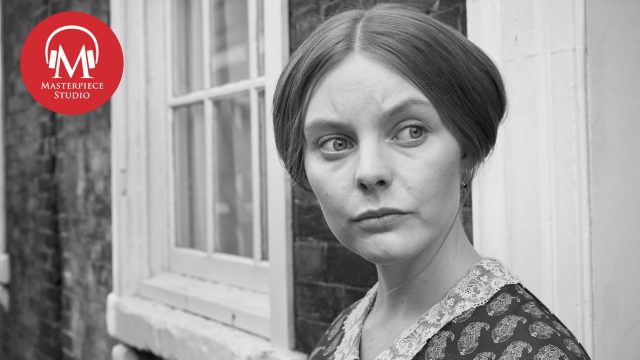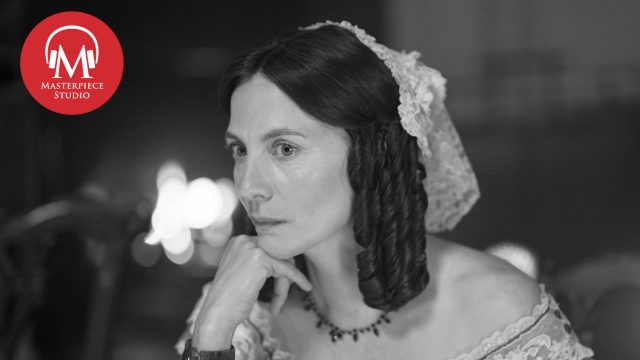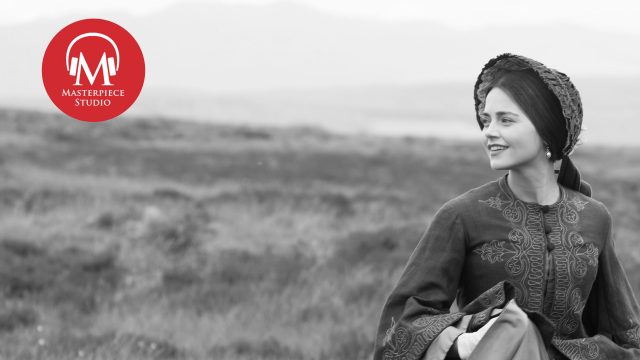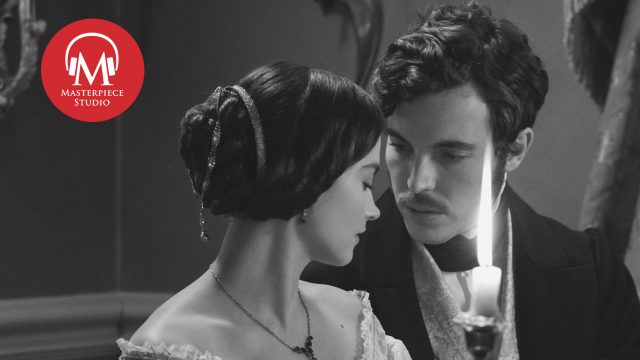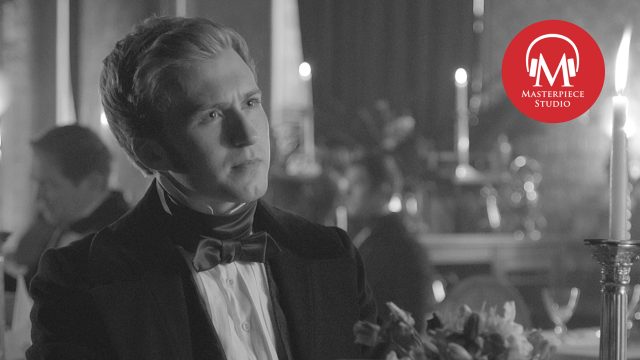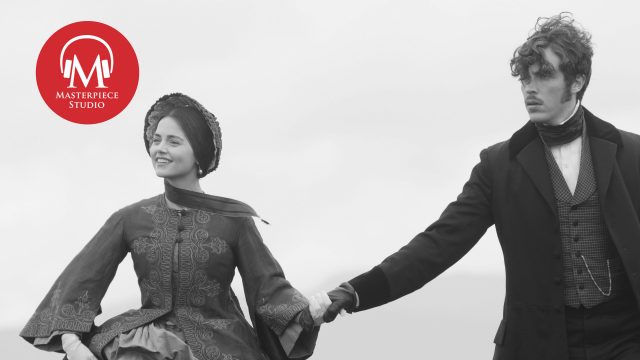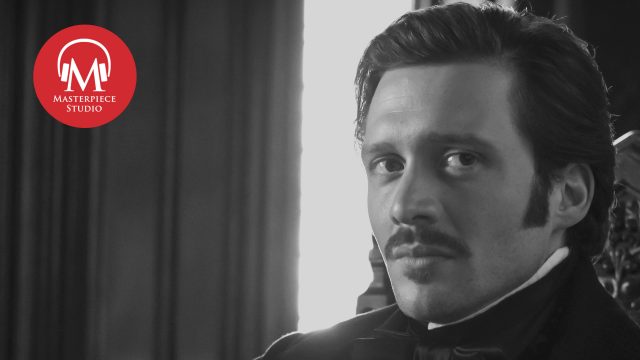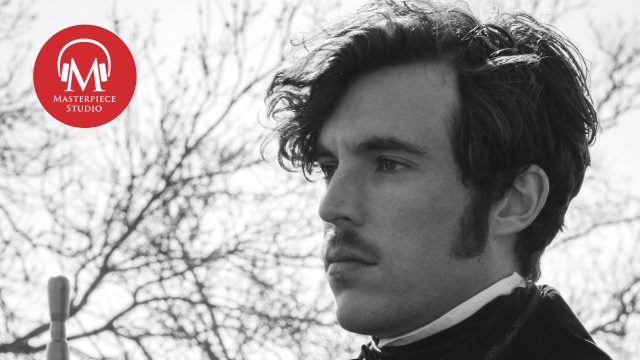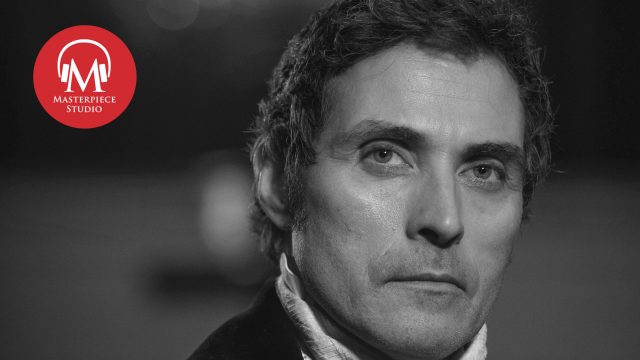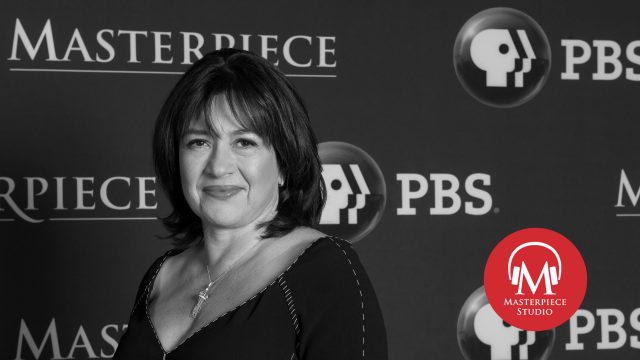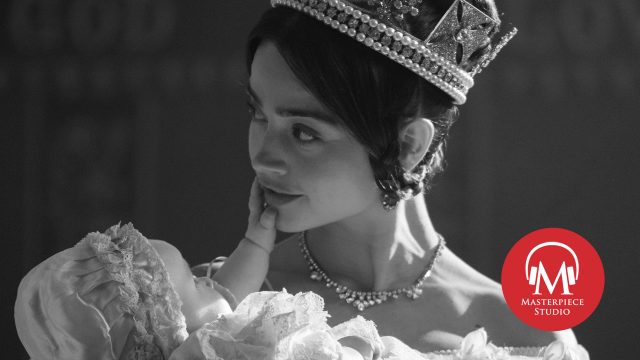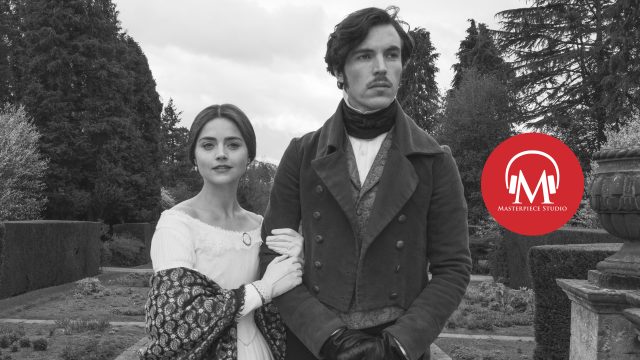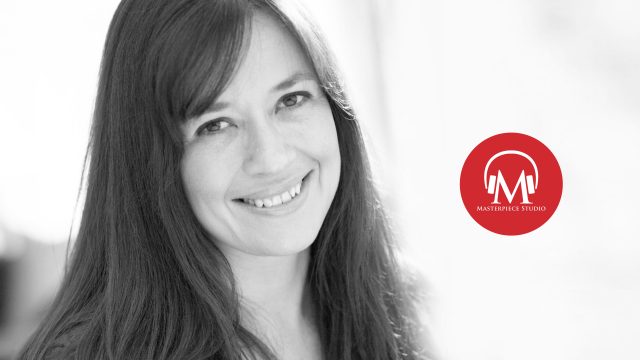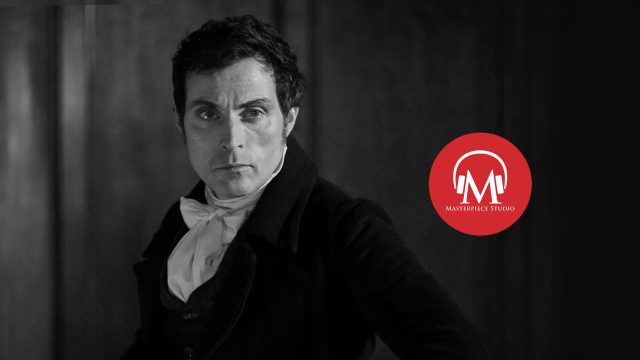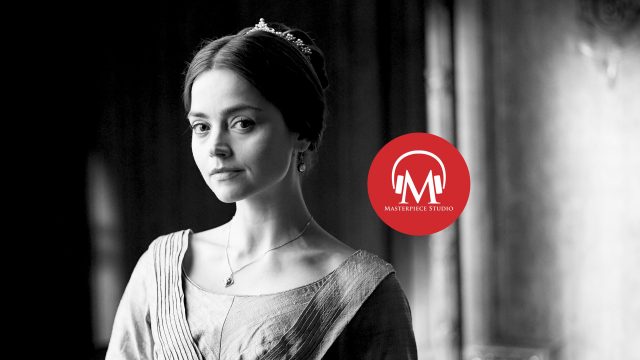Among the many fictional Buckingham Palace servants and staffers on MASTERPIECE’s Victoria, Ferdinand Kingsley’s Charles Elmé Francatelli is based on an actual royal chef and author. Kingsley’s cook is a slight bit younger — and a bit more of a rogue — than the actual Francatelli, but he’s convinced his on-screen romantic pursuits are setting the character straight. Kingsley explains here — and Victoria creator, head writer and executive producer Daisy Goodwin returns for another round of historical fact or fiction.
Download and subscribe on: iTunes | Spotify| RadioPublic
Transcript
Jace Lacob: I’m Jace Lacob, and you’re listening to MASTERPIECE Studio.
The first thing Victoria’s Charles Elmé Francatelli would have you know is that he is not a cook — he is a chef.
CLIP
Mrs. Jenkins: What are you doing? Dressers don’t courtsey to cooks.
Francatelli: But I am not a cook — I am a chef.
Jace: Francatelli, a real-life royal foodie during Queen Victoria’s early reign, was also the author of a series of wildly popular cookbooks. But in the lightly fictionalized world of MASTERPIECE’s Victoria, he’s mostly a man in love.
CLIP
Brodie: “Love is a smoked raised with the fume of sighs.” Romeo and Juliet, Act One…
Francatelli: You think I am a star-crossed lover, Brodie?
Brodie: Don’t you?
Jace: Charles and Nancy have finally tied the knot after years of courtship, and the young couple is about to leave the royal palace to start a business of their own. Actor Ferdinand Kingsley knows well the transformation of our favorite royal chef, and the transformative power of love.
Ferdinand Kingsley: When we first meet him, when he’s first taken on the job at the palace, there are a lot of things that he thinks he knows. And one of his big journeys is discovering that it’s okay not to be good at stuff the first time you try it.
Jace: Kingsley joins us to talk food, family, and fictional sugar work in a new interview. And after, Victoria creator, head writer, and executive producer Daisy Goodwin stops by for a round of Victoria fact or fiction.
Jace: And this week we are joined by Victoria star Ferdinand Kingsley. Welcome.
Ferdinand: Hi Jace, thanks for having me.
Jace: In his first appearance Charles Elmé Francatelli stares down Penge for sticking his grubby fingers into his batter. For Francatelli the kitchen is sacrosanct. What was your initial impression of Charles Francatelli as a character?
Ferdinand: He’s a funny thing because he’s a historical character who we mainly only know through his work. And so there are a lot of gaps that are fun to fill in for us as actors and the whole team working on the show. But my first reactions to seeing him were initially that he was a bit dangerous, potentially, that he was a perfectionist and that he was potentially a bit manipulative. But those things changed as I got to know him. And we as a team kind of worked out who he was going to be and who we needed him to be, and who he needed to be. So he learned a lot well about how to live through the first season, how to get what he needed in life, how to relate to other people, how to talk to women — quite a tricky thing with him. So yeah, my first instincts were that he might be well-meaning, but quite ham-fisted in his approach to other people. But an absolute perfectionist in his approach to work.
Jace: It’s interesting you use the word dangerous. I mean at first, he does seem to be almost predatory.
Ferdinand: Yeah.
Jace: You know are those first impressions deceiving or, does his attraction to Skerrett and his constant thoughts of her while at his sugar work, as he says, is that a different experience for him?
Ferdinand: Yeah I think Skerrett completely wrong foots him, to be honest. I think he when we first meet him, when he’s first taken on the job at the palace, there are a lot of things that he thinks he knows. And one of his big journeys is discovering that it’s okay not to be good at stuff the first time you try it. I think he does behave quite in quite a predatory way. He dangles things over people’s heads, that perhaps he knows more about them than they know he knows, or perhaps he knew someone who knew them, perhaps he could do something that might result in them getting fired. And that is not the best way to charm a lady — he soon finds that out. I discovered, through being given the gift of a character with a long arc, that’s something that he discovers himself is a terrible way to approach stuff, and actually is a mask I think for a deeper sense of care and desire to connect. He’s just absolutely useless at it at first.
Jace: It’s Skerrett who comes to Francatelli’s rescue in their very first meeting offering a solution to the issue of the Queen’s elaborate birthday cake and the Baroness’s plans to install gas lines in the kitchen at the same time.
CLIP
Francatelli: There are workmen with dirty boots in my kitchen, Mr. Penge. Now I’m trying to make a cake for the Queen’s birthday, a cake that will dazzle the court with its artistry, but how can I reach the very pinnacle of my craft when I’m surrounded by noise and dust and whistling!
Penge: Don’t blame me, Mr. Francatelli, blame the Baroness. She’s the one that ordered the gas to be put in, although why they had to start down here I will never know.
Francatelli: Well you must tell the Baroness that I cannot work under these conditions.
Penge: Try telling the Baroness anything.
Skerrett: She sets great store by the Queen’s birthday. I’m sure if you told her that the cake wasn’t going to be ready, she would want Mr. Francatelli to work in peace.
Francatelli: Oh thank you, Ms…?
Skerrett: Skerrett, sir.
Jace: What does Francatelli make of the Queen’s new junior dresser in this meet-cute scenario?
Ferdinand: Well I think when he first lays eyes on Skerrett, obviously there’s the spark of she’s lovely, because she is. But then, what he instantly admires I think in that second is that she’s pragmatic and that she’s a problem solver, and she’s an optimist. And I think actually, you know, we’ve talked about some of the qualities that I first saw in Charles when I first read the script, but I think the qualities of being an optimist, being a pragmatist are actually the things that defined him, so when he sees them in Skerrett, she draws them out of him. And so their first meeting eye-to-eye, is a moment of admiration as much as sexual attraction.
Jace: What was your first impression of Nell when you met her?
Ferdinand: Well there’s always a thing that happens between actors when they first meet and they know you’ve got to do a lot of work with them, where you meet them there’s something in the back of your head going, ‘Oh, please don’t be awful. Please don’t be a terrible person.’ And unfortunately Nell is a terrible person. No, I was sitting behind Nell in the car. It was freezing cold so we had these big puffer jackets on and we reached out and shook hands and went, ‘Hiya!’ And then within about ten seconds realized that we lived one street away from each other and go, ‘Oh man, we’re gonna have to be mates now.’ And so instantly we just thought, well, this is this is actually going to be OK, because I always think the less capital A acting you have to do, the better, because the camera finds acting quite garish. And that was a real gift of having, you know, whatever 80 percent of what I do being with Nell, is that we developed a real shorthand working together of not having to rummage around too deep inside to find out what we might need to say to each other in the scene, or how we might need to be with each other in the scene because we just are very easy in each other’s company. So the friendship that you see on screen between these two characters is informed a lot by how well Nell and I get on.
Jace: Why do you think that Victoria viewers have fallen in love specifically with this pair?
Ferdinand: I think it’s because we’re kind of emblematic of something a bit different in the show, which is, in a show about queens and prime ministers and royal intrigue, we are two working class people initially just trying to find a way through the world. And I think people root for us, because we’re a bit more, you know, normal, and you know, we’re kind of underdogs in this world. You can see from the moment we meet, it’s not going to be easy for us to have a life together, but you can also see from the moment we meet that it’s pretty much all we want. So there’s that tension running throughout it. And I think people want us to succeed. I think we’re just something of a bit different texture in the show. You know, we’re silly, we’re naughty, we’re a little bit more rough and ready, we’re also a sort of slightly more outside eye on stuff. The downstairs world’s great on this show, because the people downstairs do what people do everywhere, which is sit around and talk about what the poshos are doing. We’re all gossiping like mad. So we sort of voice that part of the world, where people watching the show are probably more aligned to us than they are to the Queen herself, unless the Queen watches our show, in which case, hi! But I think I think people root for us. And I think people can relate to us. We represent kind of an emerging class which is, you know, going to go on to be middle class, I guess, of non-property owners, non-landowners trying to sort of climb the ladder of society.
Jace: Well there is this sense of almost manifest destiny about it. There is this sort of much more stiff, formal, upper class atmosphere on the show. There are the sort of struggles of the very, very poor that we see especially this season and they do represent, as you said, sort of this emergent middle class that is full of aspiration — of big dreams.
Ferdinand: Aspiration is absolutely the right word, and he’s so ambitious and I think for him it’s all about not being limited by his circumstances, he wants to make his own world, make his own mistakes. And at the same time trusts his ability so much that he doesn’t think he is going to make catastrophic mistakes. They’re aspirational, and yes, of course they’re working at Buckingham Palace, so other forms of servitude are a million miles rougher than this, but service was service and it was a pretty restricted life being a servant.
Jace: I mean they serve at someone else’s pleasure.
Ferdinand: Yeah.
Jace: They have no sort of ownership of their own, or agency of their own, if you will.
Ferdinand: Exactly. They don’t get to choose very much at all. You know, they barely get to choose when they sleep. They don’t get to choose really what they eat, beyond the menu that’s on offer from Charles’ leftovers or, what he’s had a sous chef throw together, and they don’t get to choose where they go, they don’t get to choose who they love, crucially, and they absolutely don’t get to choose who they marry.
Jace: Speaking of marriage.
Ferdinand: Ah, yes, speaking of marriage.
Jace: Skerrett seems very reluctant to give her notice to Victoria.
CLIP
Skerrett: I wish you’d asked me first.
Francatelli: And what would you have said if I had? ’The Queen needs me, I can’t abandon her in her hour of need.’ Special license.
Skerrett: You know I can’t be married, I’ll have to resign.
Francatelli: You will, yes. I want to start a real life, Nancy. Tomorrow, three o’clock, St. Bride’s. I’ll be there.
Jace: How does Francatelli read Nancy’s ambivalence about leaving the Queen’s service?
Ferdinand: I think he gets it. I think he gets her ambivalence, but he, ever forceful, wants to shake her out of it. Because I mean, I, Ferdie, get it that she has come from a really perilous life. And while this one may not be perfect, it’s prestigious and it’s safe, pretty much. So why gamble everything for a promise that a chef’s given you, that you’ll be fine standing on your own two feet, that you don’t really need an employer, that you can walk away from the Queen? I mean, who resigns from a job which has daily contact with the Queen? But he truly, truly, truly believes that he can give her a better life, and a more independent life. And I think while, you know, as he often is quite blunt in what he says about stuff, he really passionately believes that she’ll be happier being her own woman, really.
Jace: Now he does a lot of surprising in this episode. He buys the hotel without telling Nancy, he gets the special marriage certificate. Is there any fear or doubt within him, putting aside that confidence, that Nancy won’t actually show up at the altar, that she’ll choose Victoria over him?
Ferdinand: Yes. I think Charles’s bravado and bravura and impulsiveness is all covering fear that it all could go catastrophically wrong at any minute. So you know, just keep those feet pedaling away to to stop it from going wrong. I think he’s terrified she’s not going to turn up, because if she doesn’t turn up, he’s going to have to marry Brodie, because there’s no one else there. Yeah, I think he is scared that she might not. But of course she’s going to, they adore each other and they’re best friends at the heart of it all. But he’s the kind of person who would rather be very confidently wrong then tentative and never find out whether he was right or wrong.
Jace: And I think that’s a virtue.
Ferdinand: It is a virtue. It’s also how gamblers live.
Jace: This is true.
Ferdinand: A lot of what he does is a gamble. He goes he goes big at every opportunity, because it’s the only way he knows how. He’s safer for it.
Jace: Which is interesting because in season two, he sells his pocket watch in order to help Cleary, whose family has been suffering due to the potato blight in Ireland, and to me that seemed like such an important turning point for this character, that he would actually do this.
CLIP
Cleary: Did you hear about the potato blight, Mr. Francatelli?
Francatelli: I know that you can’t buy decent ones at the moment for love nor money.
Cleary: In Ireland, potatoes are money. My family are small holders. Without potatoes, they can’t eat. They can’t pay the rent. If they can’t pay the rent, they’ll be evicted. And then I don’t know what’ll happen to ‘em. I’ve sent them everything I have, Mr. Francatelli. Everything.
Francatelli: A lady friend gave this to me. Don’t take less than fifty for it. It’s pure gold.
Cleary: I can’t…
Francatelli: She said it made me look like a gentleman, but I think I’d rather be judged by my actions than my appearance.
Jace: Did you read it that way at the time?
Ferdinand: Yeah, it was it was a really huge turning point and I thought that was a really key scene for for Charles. Also for Miss Cleary, I thought that was, I mean Tilly, who played Miss Cleary was just amazing in that scene. I think season two was a tough one for old Charlie, until the end, because he was having a real crisis of identity. Because in his usual way, he was so set on a track of doing a certain thing he needed to get out, be self-employed, get his book published, do whatever he needed to do. If Skerrett was going to reject him, then he doesn’t need her, he doesn’t need anyone. But that didn’t suit him. And so there’s a few episodes in season two where he’s trying to be something that he isn’t. And it all just suddenly comes into focus when he sees a girl in crisis, and it’s life and death, and she’s you know, she’s talking the language of food, she’s talking about the potato blight, and people not being able to eat. And if there’s one thing he understands, it’s the value of food, so yeah, it all just comes into focus in that moment and it suddenly becomes very simple. I like to think that that’s a moment that leads to something that Charles did in real life, because obviously we’ve had to fudge various things in historical terms, but he did write this book which which I’m a little bit obsessed with called, A Plain Cookery Book for the Working Classes, which he wrote a few years later, and in it he’s so, so passionate about food poverty and so angry about it. And in it, he says, very angrily, that he could feed a thousand people easily with the food that London threw away in a day. If there’s something that Charles understands, it’s food poverty.
Jace: Before this next question, a brief word from our sponsors…
Jace: There is a beat in this episode where it seems as though Skerrett isn’t going to show up. Then she actually does burst through the doors, with Brodie by her side. It’s a beautiful wedding scene.
CLIP
Priest: I, Nancy, take thee Charles, to be my wedded husband.
Skerrett: I, Nancy, take thee Charles, to be my wedded husband. To have and to hold, from this day forward.
Francatelli: With this ring, I thee wed. With my body, I thee worship.
Skerrett: For richer, for poorer, in sickness and in health. To love, cherish and to obey, ‘till death us do part.
Priest: In the presence of God, Charles and Nancy have given their consent and made their marriage vows to each other. I therefore proclaim that they are husband and wife.
Jace: What was it like filming this and being showered with with petals?
Ferdinand: It was the first shot of the first scene of season three that was done this year. So it was getting the old gang back together, seeing if we still remembered what our characters were called, and how they talked. We did literally call each other by our actual names by accident in a take. So we needed to limber up a bit. We’re very professional actors, and on top of everything, all the time. It was great. It was lovely getting the gang back together, in the lovely chapel up in Yorkshire where we shoot, a beautiful location surrounded by wild garlic. So yeah, it was an absolutely glorious spring day. Every actor loves being back in a job. So we were just delighted to be there. And you know, these things that you watch back and they’re in slow motion and there’s lovely music and of course, incredible lighting and everything, when you’re doing it, you’re just trying not to ruin it for everyone else because there’s so much of a dance going on around you. You know, there’s so many other people doing their jobs, that sometimes you just try not to get in their way. But it was lovely, it was a beautiful little chapel. And always great to have Tommy Knight march down the aisle spouting Shakespeare at you. Any time you see me laugh, I’m actually usually laughing at Tommy.
Jace: I love the final shot of Francatelli and Nancy in this episode. They’re smiling, they’re holding hands in the carriage as they head to what will be their honeymoon on the Isle of Wight. What does it mean to Francatelli that he successfully pulled this off?
Ferdinand: It means…it means that anything’s possible now. And of course Skerrett’s going to be thinking about the risks because they’ve quite spectacularly broken protocol. But he, with every triumph that Francatelli pulls off, he thinks he can pull off five more. So anything’s possible now, and he feels like life is in their hands. So he will be prepared to leave the palace if he needs to, and he’ll leave it with a very light heart. He knows he’s got more persuading to do, because now they’ve got to be living, as you know, dodgy husband and wife, unratified husband and wife in the Queen’s household. They’ve also got a free honeymoon, which is pretty cool. And also they like being naughty, these two. They like a bit of the danger. They like hiding away in various closets. They like sneaking off whenever they can. And they like kind of pushing it in terms of who knows, who they can trust. Can they tell Penge? Of course not. But do they want to tell Penge? Of course they do, they want to rub it in. So it’s life is at this point is pretty thrilling. The game is on for Francatelli at this point. He’s delighted.
Jace: Food is at the very heart of their rather chaste courtship. Meringues, hot chocolate, strawberry tarts. Is it a Victorian stand-in, as it were, for more carnal pleasures?
Ferdinand: Absolutely is. There’s, I mean it’s not even a very heavily disguised one. It’s the food he gives her, and the way he tries to give it to her — it’s so sensuous, and any excuse to get near her, to touch her hand, to touch her face, to touch her mouth. I mean seriously, and to sometimes be able to do almost in public, if he can turn around, and you know, give her a bit of food in public, then that’s a little bit of code between them, and it will be forever, it always is, it was when they went on their first date, you know with the bombe surprise, it was when they went on their date when they went boating Hyde Park, they’re still talking about his tarts then, it is absolutely a metaphor for what they both want. They can’t keep their hands off each other, they’re wildly in love and they’ve had to work for it. And of course what’s easy to forget is that it’s a couple of years in in our time, you know, in terms of how long Victoria’s been on, but that much more time has elapsed since they first met. So it’s been a really hard won battle to be able to get in a room with each other and take each other’s clothes off, that has taken a long time.
Jace: Looking back at the past two and a half seasons or so, do you have a favorite scene from Victoria thus far.
Ferdinand: Favorite scene — I think my favorite scene was the downstairs dance at Christmas.
Jace: Oh yes.
Ferdinand: Oh it was great. We spent days working on that, and then we had so much to cover. I mean, it’s only a few minutes of screen time, but think of all the stuff that was down there, all the people that were down there, all the food that was down there. And there was something like five dances, which on the day we discovered we had to do without our shoes on for sound quality purposes. Oh, it was great, it was great, it was great to bring the upstairs lot, the stiff lot, to bring them down and loosen them up a bit. It was great. Not that it’s us versus them.
Jace: Never.
Ferdinand: But it is of course, us versus them.
Jace: Your Twitter background is a Google search for your name, with the results showing, ‘Ben Kingsley with hair.’
Ferdinand: Yeah. ‘Did you mean?’ That’s what comes up, ‘Did you mean?’
Jace: What is your relationship to your lustrous mane?
Ferdinand: To what, to my hair?
Jace: Yeah.
Ferdinand: My hair is, it’s pretty essential at the moment because you take it off and I kind of look like my dad already, and it’s probably it’s an inevitability isn’t it? That I’ll eventually end up looking exactly like him. What is my relationship to my hair? Well it’s a bit greasy at the moment and threatening to turn white overnight. But it’s still here, it’s hanging on. I’m in my 30s now and it’s clinging on to my scalp, happily, at the moment. As long as I don’t get too stressed, and then it might all jump off. I think dad’s relationship to my hair’s probably more intense than mine. He covets it.
Jace: Oh.
Ferdinand: I said something the other day to him about, ‘Oh, I think I’m going grey a bit on the temples,’ and he went, ‘Nice problem to have.’
Jace: This is true. This is true. I mean your parents are of course Oscar-winner Sir Ben Kingsley and theatre director Alison Sutcliffe. Did you always intend to follow in your parent’s theatrical footsteps?
Ferdinand: No. I mean probably. I wanted to be a fireman, I wanted to be a footballer, I wanted to be an astronaut, you know. But there aren’t many kids who don’t want to be one of those things for a while. But I grew up in Stratford upon Avon where old Willy Shakespeare’s from, and my mum still lives there, and that’s where my parents met, and worked for many many, many years. And when I was growing up, my mum was working in the theatre so I would always be going to wait for her while she was, because you know theatre work is primarily in the evening, so I would often be waiting at the theatre for her. And I fell in love with the world. So it was less a case of following my dad’s footsteps, as people often want to put it, and more a case of falling in love with the theatre world. I played a lot of child parts at the RSC when I was growing up, I did three or four plays there? Playing, well, started out by playing, you know boy at party in Romeo and Juliet and then some really depressing Ibsen, and various other things. And I have this memory of — it’s probably about 15 memories fudged together — but of sitting in the green room at the Royal Shakespeare Company having a Twix and a cup of juice getting my pocket money for doing my hobby, telling these, the way I saw it as an eight, nine year-old, just telling these amazing stories in front of hundreds of people and people laughing, or not really laughing, if it’s an Ibsen, and going on adventures and watching grown-ups doing that all the time. I was watching them go on these adventures every night, and thinking, ‘Well this is my hobby, and I’m getting pocket money for it, which is great. They’re doing it all the time. Maybe I could do this? Hey diddly-dee!’ But it it wasn’t always going to be the case. I very nearly went on a slightly different path of going to university, and wondering whether I wanted to work as a journalist, or as a writer, but then I got in to Guildhall, Guildhall School of Music and Drama, which is a really great drama school in London. And yeah, they were foolish enough to let me in as a little 18 year-old, and I sort of had to, not justify it to my parents, but they both said, you know, ‘This isn’t easy. It’s not an easy life, it’s quite a lonely life, it can be quite a lonely life, it can be quite an impoverished life for large swathes of it, unless you are one of the luckiest actors in the world like like Dad ended up being after a long time working, and not working and it can be tough on your family,’ and I was like, ‘I know that, you know you guys aren’t together anymore.’ But once I’d sort of wrestled with all those things, as much as an overexcited 18 year-old can do, they both went, ‘Well great. Obviously it’s what you should do if you go into it with your eyes open.’ And then I went to Guildhall.
Jace: And the rest was history.
Ferdinand: And the rest was sort of history. I mean, I went very young, I went when I was 18, so I was really lucky. With hindsight, it would have been great if I were a bit less green when I turned up, you know, I was like a little puppy dog, yes to everything, just eager to please, and didn’t want to, you know, shake the cart too much, just wanted everyone to be nice to me, and me be nice to everyone else. So with hindsight, I would have loved to have been a bit grittier when I started my training, but I had the best time there, it is such an amazing drama school. I’m so thankful for it, and here I am largely working.
Jace: Largely working.
Ferdinand: Largely working, still getting mixed up with Dad. People always do that. They look at the name on a piece of paper if I’m signing in somewhere, and then look up at me, and they look up and down a couple of times and go, ‘Oh yes, I suppose if you took the hair off.’
Jace: It’s the hair, hold on to that hair.
Ferdinand: That’s all I’ve got, man. That’s all I’ve got.
Jace: Ferdinand Kingsley, thank you so very much.
Ferdinand: Thank you very much, Jace. Lovely to speak to you.
Jace: And we are back with Daisy Goodwin. Welcome.
Daisy Goodwin: Hi Jace!
Jace: Princess Louise is born in this episode. Given that this is now Victoria’s sixth pregnancy, have her views on pregnancy or childbirth changed from the terror she experienced earlier in life?
Daisy: I don’t think she’s terrified, but I think she doesn’t enjoy it. She’s not a natural childbirth-type mother. I think she finds it she finds it very demeaning, and certainly when she’s offered the chance to have pain relief, she takes it very gratefully.
Jace: Fact or fiction: Louis-Philippe’s presence at the palace is causing all manner of provocation, including riling up Bertie and Vicky about la Guillotine. It becomes clear that he can’t stay on at Buckingham Palace. Did Victoria offer up Leopold’s vacant Surrey estate, Claremont, as a new home for the deposed king?
Daisy: Yes she did. She was very generous. She offered him this beautiful country house for him to live in, and that’s where he lived for the rest of his life, which was not that long actually. He never really recovered from being deposed.
Jace: And Claremont itself was a wedding present to Leopold and Charlotte upon their marriage, correct?
Daisy: Yes that’s right, absolutely.
Jace: Feo is plotting away in this episode and she seems determined to drive a wedge between Victoria and Albert. What was Victoria’s view of her sister in real life?
Daisy: Well she doesn’t really talk much about her sister. There’s one moment where Victoria goes to Germany and she goes pretty much next door to Feodora’s castle, and doesn’t stop and say hello. So I don’t think they got on that well, that’s my guess.
Jace: Fact or fiction: did the government conspire to plant rifles on the Chartists and or secretly infiltrate the organization?
Daisy: There was definitely evidence of agent provocateurs being used throughout this period. You know, it’s a moot point. I mean the Chartist protests actually just fizzled out. And in fact in true British fashion, it was the weather that stopped the revolution, nothing else. It started to rain. So instead of, you know, a crowd of two million people, it was only 20,000. So that’s the story.
Jace: Francatelli and Nancy are married at St. Bride’s Church. Rumor has it that the Christopher Wren-designed church was in fact the inspiration for the wedding cake as we know it today. Given Francatelli’s background as a confectioner and chef, was the choice of St. Brides intentional?
Daisy: Of course it was, Jace. Of course it was. Yes, we definitely had that in mind.
Jace: I loved the beautiful scene of Victoria in the empty throne room, when she considers the throne as if wondering if she’ll ever sit upon it again. Does this feel as though it’s a Rubicon of sorts for her?
Daisy: Yes, definitely. I think she is heartbroken that she’s being forced to leave London. She feels she is deserting her post, but you know, Albert’s made it very clear that she’s got to go. And you know, she owes it to him and she owes it to her children and you know she can’t really decide where her duty lies and she doesn’t want to look like a coward. But on the other hand she has no choice. You know the danger seems very real and present so she has to go and she doesn’t know what’s going to happen so that is a moment of real agony for her, really.
Jace: Fact or fiction: did the sense of unrest in London from the Chartists lead the Royal Family to decamp to Osborne House in the Isle of Wight?
Daisy: Yes it absolutely did. They left just as they do in the show. They went to Osborne and they stayed there until it was considered safe for them to come back. And you know, I think there was a lot of people who thought that she’d run away, and Victoria kept writing back and saying, you know, ‘Do people think I’ve run away?’ So she felt very guilty about it.
Jace: What is the significance of the painting of Hercules being held captive by Omphale and spinning wool for her. Is that how Albert sees his own relationship with Victoria?
Daisy: I think it’s an elaborate joke on Albert’s part. I mean, that painting really was in Albert’s bathroom in Osborne, and he bought it specially, and you know it’s a very strong man kind of being held in bondage by a Queen, and being forced to, you know perform menial domestic tasks. It shows that Albert really did have a sense of humor, and I love the fact that, you know, he, you know, you can see at Osborne, he lies in his bath, and looks at this painting. And I just thought that was the most glorious thing so I was determined to put it in the show. It’s the sort of detail, a detail you couldn’t make up.
Jace: No, it’s fact is…
Daisy: It’s always stranger than fiction I think it’s always, yes.
Jace: Daisy Goodwin, thank you so much.
Lady Emma Portman is the royal court’s main keeper of secrets, keeping a close eye on Queen Victoria and all of her royal retinue while giving up very little of her own personal history. Actor Anna Wilson-Jones takes us inside the gilded, glittering gossip in Buckingham Palace.
Anna Wilson-Jones: She doesn’t miss a trick, Emma. She knows who loves who, she knows what people think. She hints at that restraint that you have to have as a woman.
Jace: Wilson-Jones joins us next week on the podcast to reveal what the elusive Lady Portman really knows.
MASTERPIECE Studio is hosted by me, Jace Lacob and produced by Nick Andersen. Elisheba Ittoop is our editor. Susanne Simpson is our executive producer. The executive producer of MASTERPIECE is Rebecca Eaton.
Victoria Podcasts 20 More Podcasts
MASTERPIECE Newsletter
Sign up to get the latest news on your favorite dramas and mysteries, as well as exclusive content, video, sweepstakes and more.








